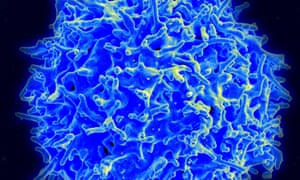IMM-101 drug has extended lives of people with metastatic pancreatic cancer and appears to have no side-effects
A new drug that “wakes up” the immune system to attack cancer has extended the lives of people with metastatic pancreatic cancer and has no side-effects, raising hopes for a new and powerful tool against the most intractable form of the disease.
The drug, IMM-101, is considered groundbreaking because pancreatic cancer that has spread to other parts of the body usually kills within a few months.
The patients who were given the new immunotherapy drug actually felt better than those who were on standard chemotherapy, said Angus Dalgleish, professor of oncology at St George’s, University of London, who led the research.
Dalgleish is excited by the potential of the immunotherapy drug, although the trial is relatively small, involving 110 people. Only 18% of patients with advanced pancreatic cancer are alive after one year and 4% after five years, so new treatments for the disease are badly needed.


